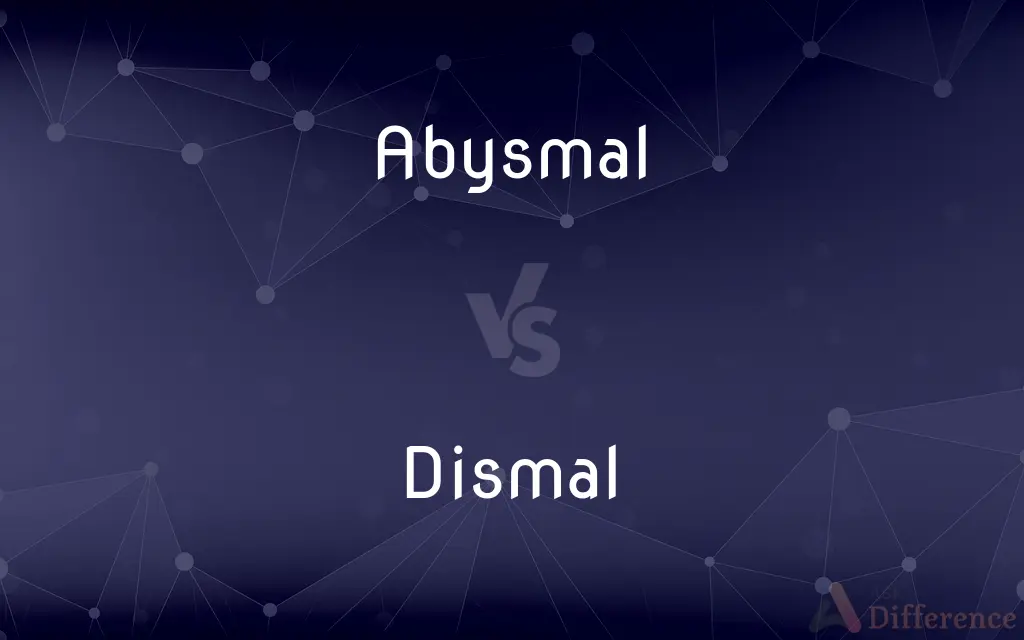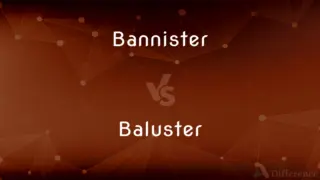Abysmal vs. Dismal — What's the Difference?
By Urooj Arif & Fiza Rafique — Updated on April 15, 2024
Abysmal describes something extremely bad or deep, often metaphorically; dismal denotes gloom or depression, commonly related to appearance or weather.

Difference Between Abysmal and Dismal
Table of Contents
ADVERTISEMENT
Key Differences
Abysmal often connotes a profound depth or a severe state of being, such as "abysmal ignorance" suggesting a bottomless extent of lack of knowledge. On the other hand, dismal typically refers to causing gloom or depression, as in "dismal weather," implying dreariness and sadness.
When discussing quality, "abysmal performance" indicates a very poor level, almost to the point of hopelessness. Whereas, "dismal failure" might not only denote failure but also a depressing or disheartening atmosphere surrounding the event.
In literature, abysmal can be used to enhance the severity or profoundness of a situation or condition, suggesting an immeasurable and often overwhelming state. In contrast, dismal is frequently used to set a somber or bleak mood, contributing to an overall feeling of despair in the narrative.
The scope of abysmal can extend beyond tangible measurements, often used hyperbolically to describe situations or qualities. Dismal, however, typically remains closely tied to its literal meanings of dreariness or depression, rarely straying into hyperbole.
The emotional response elicited by abysmal might be one of shock or disbelief due to the extremity implied. Conversely, dismal often evokes a milder, melancholic reaction, aligned with its associations with dullness or depression.
ADVERTISEMENT
Comparison Chart
Primary Connotation
Extremely bad, profound depth
Gloom, depression, dreariness
Usage in Context
Quality, depth
Weather, mood, failure
Emotional Tone
Severe, overwhelming
Sad, melancholic
Common Associations
Ignorance, failure, depth
Weather, light, mood
Literary Use
Hyperbole, severity
Mood setting, descriptive
Compare with Definitions
Abysmal
Profoundly bad or severe.
The crisis reached an abysmal point.
Dismal
Very poor.
The reviews for the movie were dismal.
Abysmal
Extremely poor.
His first attempt at baking was abysmal.
Dismal
Depressingly dreary.
The landscape looked dismal under the overcast sky.
Abysmal
Bottomless.
She felt an abysmal sadness within her.
Dismal
Gloomy, joyless.
The room had a dismal lack of decoration.
Abysmal
Hopelessly bad.
The team's defense was abysmal.
Dismal
Causing gloom or depression.
His dismal expression reflected his mood.
Abysmal
Very deep.
The ocean's depths are abysmal.
Dismal
Dull, bleak.
The dismal economy affected everyone's spirits.
Abysmal
Abysmal is the seventh studio album by American death metal band The Black Dahlia Murder. It was released on September 18, 2015 through Metal Blade Records.
Dismal
Causing gloom or depression; dreary
Dismal weather.
Took a dismal view of the economy.
Abysmal
Resembling an abyss in depth; unfathomable.
Dismal
Characterized by ineptitude, dullness, or a lack of merit
A dismal book.
A dismal performance on the cello.
Abysmal
Very profound; limitless
Abysmal misery.
Dismal
(Obsolete) Dreadful; disastrous.
Abysmal
Very bad
An abysmal performance.
Dismal
Chiefly South Atlantic US See pocosin.
Abysmal
Pertaining to, or resembling an abyss.
Dismal
Disastrous, calamitous
Abysmal
(figurative) extremely bad; terrible.
Dismal
Disappointingly inadequate.
He received a dismal compensation.
Abysmal
Pertaining to, or resembling, an abyss; bottomless; unending; profound.
Geology gives one the same abysmal extent of time that astronomy does of space.
Dismal
Causing despair; gloomy and bleak.
The storm made for a dismal weekend
Abysmal
Very great; limitless;
Abysmal misery
Abysmal stupidity
Dismal
Depressing, dreary, cheerless.
She was lost in dismal thoughts of despair
Abysmal
So deep as to be unmeasurable;
The abyssal depths of the ocean
Dismal
Fatal; ill-omened; unlucky.
An ugly fiend more foul than dismal day.
Dismal
Gloomy to the eye or ear; sorrowful and depressing to the feelings; foreboding; cheerless; dull; dreary; as, a dismal outlook; dismal stories; a dismal place.
Full well the busy whisper, circling round,Convey'd the dismal tidings when he frowned.
A dismal description of an English November.
Dismal
Depressing in character or appearance;
Drove through dingy streets
The dismal prison twilight
Drab old buildings
A dreary mining town
Gloomy tenements
Sorry routine that follows on the heels of death
Dismal
Causing dejection;
A blue day
The dark days of the war
A week of rainy depressing weather
A disconsolate winter landscape
The first dismal dispiriting days of November
A dark gloomy day
Grim rainy weather
Common Curiosities
How is abysmal different from extremely bad?
Abysmal implies a depth or extent of badness that is bottomless or profound, adding a dramatic emphasis beyond just "extremely bad."
Is dismal always used negatively?
Yes, dismal conveys a negative sentiment associated with gloom, sadness, or bleakness, although it is less intense than terms like "horrible" or "terrible."
What is a metaphorical use of abysmal?
Abysmal is often used metaphorically to describe situations or qualities that seem impossibly deep or infinite, such as "abysmal ignorance."
Can dismal describe a person’s mood?
Yes, describing a person’s mood as dismal suggests they are feeling particularly gloomy or downhearted.
Are there synonyms that can replace dismal in a sentence without changing the meaning?
Yes, words like gloomy, dreary, or bleak can often replace dismal without significantly altering the meaning.
What types of situations are typically described as abysmal?
Situations that are hopelessly bad, such as catastrophic failures or extremely poor conditions, are often described as abysmal.
What is an example of abysmal used in a positive context?
It is rare, but abysmal might be used in a positive context hyperbolically, such as in "abysmal richness" referring to an overwhelming abundance.
What is an example of using dismal in everyday conversation?
One might say, "The weather has been dismal all week," to describe continuous rain and overcast skies.
How does the intensity of abysmal compare to other negative descriptors?
Abysmal is one of the stronger negative descriptors, suggesting an extreme level of severity or depth compared to words like "bad" or "poor."
Is it appropriate to use abysmal to describe minor inconveniences?
No, using abysmal for minor issues might be seen as an exaggeration, as the term implies a significant or profound level of badness.
Can dismal be used to describe sounds or noise?
Yes, dismal can describe sounds, especially when they contribute to an atmosphere of dreariness or sadness, such as a dismal howl of the wind.
How does the term dismal relate to historical or literary settings?
In historical or literary contexts, dismal can set a mood or scene that is particularly joyless, somber, or oppressive.
What visual imagery might be associated with dismal?
Dismal often conjures images of dark, overcast skies, barren landscapes, or neglected places.
Can abysmal and dismal be used interchangeably?
While both indicate negative qualities, they are not usually interchangeable because abysmal emphasizes depth or extremity, while dismal focuses on inducing gloom or melancholy.
Does the use of abysmal or dismal vary by region?
Usage might vary slightly, but both terms are commonly understood in English-speaking regions to denote extreme negativity, with abysmal often being more intense.
Share Your Discovery

Previous Comparison
Bannister vs. Baluster
Next Comparison
Mixer vs. FaucetAuthor Spotlight
Written by
Urooj ArifUrooj is a skilled content writer at Ask Difference, known for her exceptional ability to simplify complex topics into engaging and informative content. With a passion for research and a flair for clear, concise writing, she consistently delivers articles that resonate with our diverse audience.
Co-written by
Fiza RafiqueFiza Rafique is a skilled content writer at AskDifference.com, where she meticulously refines and enhances written pieces. Drawing from her vast editorial expertise, Fiza ensures clarity, accuracy, and precision in every article. Passionate about language, she continually seeks to elevate the quality of content for readers worldwide.
















































